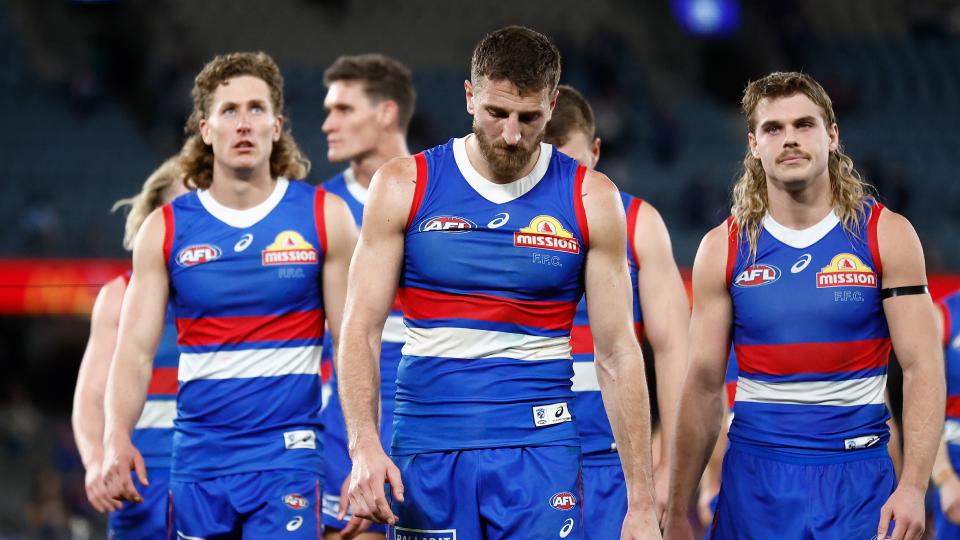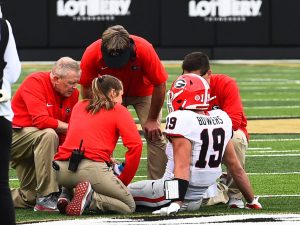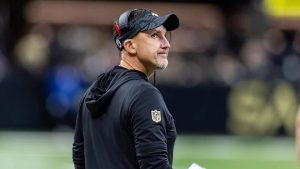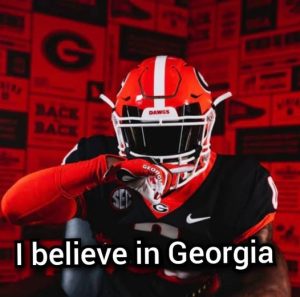
Ron Doig, a brilliant footballer and manly sportsman, played the last game of his career on Saturday. His tragic passing a few hours later deeply shocked the sporting community of the State, who admired him for the ideals of genuine sportsmanship, which stamped his character both on and off the playing field.

It is apparent now that when South Fremantle was fighting their last valiant fight for the honors of the semi-final in the closing stages of the last quarter, their captain had already’ entered upon his ‘last shadowed hours.’
Before the half-time interval, it was known that he had had a severe buffeting in a game which, was always hard, but, whatever his thoughts and feelings may have been at that stage he returned to the field and took a prominent part in the play.
Game to the end
At a later stage an ankle knock compelled his retirement from centre-half forward to a forward pocket. He had set his heart on winning the semi-final, and when East Perth made their winning run Ron Doig, with the lion-hearted courage that was part of his make-up, hobbled to the other end of the field in a vain attempt to stem the tide.
It transpires that when Doig went to the rescue of his back men he was in a condition of acute distress and was sobbing. It is also known that before the match began he was in a state of agitation. His pent-up feelings and the severe test that a vigorous game imposed, in which hard knocks were always the order, only too clearly revealed themselves at its close.
He was taken to his home, and it quickly became apparent that his condition was grave. He told a friend who was attending him that he was in a bad way. He fought to the last, but in the closing hours lapsed into unconsciousness.
Second generation

Doig represented the second generation of a family which claims an illustrious and unique record in W.A. football history, and none was better qualified to maintain its traditions than he was. He was a son of Mr. J. ‘Scotty’ Doig, who, like several other members of the family, were distinguished players of the Port teams in the earlier years of the century.
At the age of 23 years Ron Doig was one of the youngest captains and coaches in the history of the game. He was one of the few who had represented their State both in football and cricket. Last year he captained the Fremantle ‘A’ grade pennant team.
Rival team’s tribute
The news of the tragedy created profound shock throughout sporting circles. Yesterday morning it reached the training quarters of the East Perth club, the winners of the semi-final, and dropped like a bombshell on a scene of animation and joy as players were recalling the eventful incidents of the game, in which the side had scored a great victory.
When the report was confirmed players, officials, training staff and visitors stood for two minutes in respectful silence. A gloom pervaded the rooms for the rest of the morning. Mr. F. D. Book (secretary) and Mr. V. Sparrow (coach) immediately motored to Fremantle to convey to the bereaved relatives and to the South Fremantle club their personal expressions of sympathy on behalf of the East Perth club.
…
Ron Doig buried
Ron Doig, the 23-year-old coach of the South Fremantle team, who was injured in Saturday’s semi-final against East Perth, and who subsequently died at his home, was buried this afternoon. Footballers from all parts of the metropolitan area joined with citizens of the Port in paying a last tribute to a brilliant player.
Rarely has such a scene been witnessed at Fremantle. The cortege, headed by players and officials of the South Fremantle Club passed through two long lines of footballers. Each league club was represented.
The casket was borne to the graveside by Doig’s team-mates, the pall bearers being the Mayor of Fremantle, Mr. F. E. Gibson, the secretary of the W.A. National Football League, Mr. W. Orr, the secretary of the South Fremantle Club, Mr. P. Winch, and Messrs. W. Hardiman, V. Carlson, R. Bryant, D. Hines and W. Ross.
Medical report
A medical report on Doig’s death was sent to the District Coroner, Mr. H. J. Craig, R.M., earlier in the day, who ordered that an inquest be held. The coroner stated that the inquest would be held at Fremantle and that a medical man, probably Dr. H. Field-Martell, J.P., would preside.
No date has yet been fixed, but police inquiries for the preparation of the brief are now in progress. Doig’s team mates, some of those in his company after the match and the field-umpire of the game (T. Campbell) will probably be called on to give evidence.
The Fremantle police surgeon (Dr Alan Bean), who conducted the post mortem, reported that Doig’s death was caused by a cerebral contusion.
Vigorous game
Saturday’s game was one of the hardest in the history of the two clubs, who are noted for the vigorous finals which they have staged in previous years. In addition, to the tragic accident to Doig, many players were injured.
George White, the South Fremantle centre-man, who received a knock in the last stage was found to have had his jaw fractured in two places. Pead, who sustained slight concussion early in the game, and Metherell, who was hurt later, have both recovered. Cronin, the East Perth pivot, is under medical treatment for a nasty knee injury, while Screaigh received a severe knock above the right thigh, which forced him off the field. He will be in the doctor’s hands for the next fortnight in the hope that he will be fit for the final. Several other players in both teams were extensively bruised and sore.
According to ‘Kudex,’ The Daily News football writer who reported the game, however, the play was rugged rather than rough. Both sides were determined to win. Kudex said today, and it was hard slogging football right through. There were one or two instances of recklessness which might have been obviated, but keenness and determination rather than spite, were the keynotes of the encounter.
‘Sacrificed to make a Roman holiday!
With these strong words the Acting Coroner (Dr. H. H. Field Martell) summed up the death of Ronald Oldham Doig and reflected severely on the more strenuous type of football in this State during the course of an inquest held in the Fremantle Police Court this week.
The inquest was the outcome of the tragic end of Ronnie Doig, captain and coach of the South Fremantle football team, a few hours after the finish of the eventful semi-final between his team and East Perth on September 17. The suddenness, and the tragic manner of his death shocked the whole community and it is not unlikely that an agitation for a far reaching revision or alteration of the rules of our national game may result.
The first of the nine witnesses was ARCHIBALD WILLAM STRANG who will be more easily recalled by football followers of other days as ‘Archie’ Strang, one time a stalwart in the ranks of East Fremantle and as rugged and game a player as they made ’em. Strang (with whom Father Time has dealt kindly) after giving evidence of identification, said that he was at the match and considered it was fairly willing. He saw deceased playing at centre half forward and get knocked down a couple of times ‘Before he went down,” said witness, ‘you could see boots going and arms flying.’
Of quiet appearance and looking through horn-rimmed spectacles, DR. JOHN HORAN, the well-known medico, told how it was his custom to be present at football matches and attend injured players. At the semi-final he attended Doig and Screiagh (E.P.) during the first-quarter and Doig again in the last quarter. Doig appeared slightly dazed, the doctor said, in the last quarter as if he had slight concussion. The doctor advised him to leave the ground but he positively refused to go, saying he wanted ‘to win the game. Pead and Screiagh, however, left the ground on the doctor’s advice. In Dr. Horan’s opinion is was impossible to say whether, if Doig had left the ground he would have survived.
DR. ALLAN BEAN, the tall, spruce young Fremantle medico, related that he had seen Doig at half time when he appeared all right. He again saw him at his home about 7 p.m., when he was ‘like a man who had had a bad shock.’ Doig was ordered to bed and the doctor left, only to be recalled a few minutes later when he found deceased in the throes of convulsions and immediately ordered him to hospital where he died close on midnight.
Next day the doctor conducted a post mortem in which he arrived at the conclusion that death had been caused by a blow that had affected the brain. The injury itself was not a mortal one but it was accentuated by the fact of deceased’s remaining on the field. The only sign of external injury he could find was one or two slight abrasions.
”Sandy’ Oswald will have the formidable task of watching Ronnie Doig tomorrow. What a stirring struggle it should be! A lot depends on this encounter for we realise what damage Souths’ skipper can do if not checked.’
Little did BILLY THOMAS, the crack East Perth footballer and a former Sandover Medallist imagine as he broadcast those sentences inter alia on the eve of the semi-final, that he would subsequently be questioned very closely on them.
SERGEANT TUOHEY who assisted the Coroner, asked Thomas (who is a telegraphist at the G.P.O.) what he meant by the word ‘checked.’ Did it not imply the use of physical force? Witness, who gave his evidence unhesitatingly and well, stoutly denied this interpretation, and said he meant simply a superior ability in a football sense. There was no enmity between East Perth players and those of South Fremantle.
‘Doig got into a bit of a mix-up in the first quarter and came out and spat out a tooth, and the umpire chatted him for rough play,’ said WILLIAM BURROWS, a trainer of Souths, who gave his evidence in ‘Dinkum Aussie.’ ‘In the last quarter he got bowled over and I went out with the ambulance chap. When Jennings got knocked out I again went out with the ambulance man, who said to the umpire ‘If you can’t control the game why don’t you get the police?’ The umpire said he was umpiring to instructions and if the ambulance man wanted it altered to see Billy Orr!’ I said something to Campbell but he ordered me off the field. I said I would be glad to be off the field as I was doing nothing but running on and off attending to players. Deceased said he was getting battered about but would even it up before he finished. It was a one sided match. South Fremantle started to get into it and they were checked, but the other side were allowed to go for their life.’
THOMAS RICHARD KENNEDY, a St. John’s Ambulance man said that he knew of no official with any power to order a man off the ground except the captain of his side.
ARTHUR RETELL, the burly South Fremantle ruckman, better known to football fans as ‘Bull,’ said that Doig was well watched by opponents as far as the ball was concerned but he did not see anyone knocking him about. Retell related now he had seen Doig just after the match, when he appeared ‘to be all nerves,’ which witness put down to disappointment over losing the semi. Speaking of the match, Retell said: ‘I don’t think the umpire did have charge of the game. He did his best but it was a difficult game to handle. Everyone was keyed up and the players were putting a little extra bit of vigour into it. I heard the umpire cautioning players and I am of the opinion that he did his best under the circumstances.’
Necks were craned forward when THOMAS HENRY CAMPBELL, who umpired the match, stepped into the box. Well dressed, keen and athletic looking, Campbell gave his evidence well. In his opinion the game was under control from start to finish. A murmur—not the first by any means—ran through the crowded gallery—obviously a sea side ‘house’—when he said that he had had occasion to caution quite a few players all of whom were South Fremantle men for over ruggedness early in the game. He later cautioned players of both sides. Asked by the Sergeant to name those he had cautioned, Campbell mentioned White (for making a bit at Cronin), Jennings (for violently pushing O’Reilly after taking a mark), Collins and Lalor (for fighting), Newman (on three occasions for over vigor),and Metherall.
‘I’m satisfied,’ said witness, ‘I did my very best from the word ‘Go’ to check rough play. My powers on the field were used to keep the game going and it was the fastest game I have ever seen in my life. ‘You could hear the hiss and the bang of the bumps and knew the players meant every inch of it.
Acting Coroner: ‘What do your powers of stopping rough play consist of?’ Witness: ‘Penalising an offender by awarding a free kick against him and reporting him. Say a man went bull headed into it and said, ‘Well I’m going to have a go?’—he could go for his life. Could you call a policeman? — Yes.







